- Home
- Maggie O'Farrell
I Am, I Am, I Am: Seventeen Brushes With Death Page 3
I Am, I Am, I Am: Seventeen Brushes With Death Read online
Page 3
—
There is nothing unique or special in a near-death experience. They are not rare; everyone, I would venture, has had them, at one time or another, perhaps without even realising it. The brush of a van too close to your bicycle, the tired medic who realises that a dosage ought to be checked one final time, the driver who has drunk too much and is reluctantly persuaded to relinquish the car keys, the train missed after sleeping through an alarm, the aeroplane not caught, the virus never inhaled, the assailant never encountered, the path not taken. We are, all of us, wandering about in a state of oblivion, borrowing our time, seizing our days, escaping our fates, slipping through loopholes, unaware of when the axe may fall. As Thomas Hardy writes of Tess Durbeyfield, “There was another date…that of her own death; a day which lay sly and unseen among all the other days of the year, giving no sign or sound when she annually passed over it; but not the less surely there. When was it?”
If you are aware of these moments, they will alter you. You can try to forget them, to turn away from them, to shrug them off, but they will have infiltrated you, whether you like it or not. They will take up residence inside you and become part of who you are, like a heart stent or a pin that holds together a broken bone.
—
Recently I was going through old boxes and files, looking for some faxes I had received in the 1990s. I came across a slew of other things: photos of people I had all but forgotten, birthday cards, Valentines, cinema stubs, train tickets, museum guides, maps of cities I once visited. I came across a letter, written to me by one of the boys at the harbour that night.
It was sent to my university address. He and I were, by that time, studying at opposite ends of the country, and school seemed a very long time ago. He wrote, in looping black ballpoint, that I had made him miserable at school: I would never commit to him, never agree to be his, always evaded him. We always got on well, he wrote, so why? Why wouldn’t you be my girlfriend?
I remembered getting the letter; I remembered reading it as I walked to a seminar, my books and notes in my bicycle basket. I wrote back to him a few weeks later, saying that I was sorry, more than sorry, for making him unhappy. I had no idea, I wrote, you felt that way.
This, of course, isn’t true. I must have known it before I read the letter and also while I replied to it, sitting at my university desk, with my pad of paper resting on my lecture notes, my library books, my unfinished essays.
—
It is this boy who comes in after me. I am still under the water and my muscles are tiring, my mind is beginning to drift. The boy is a committed water-skier, kayaker, dinghy-sailor: he spends most of his spare time in or on the sea. The bathroom at his house is always full of dripping, sandy wetsuits, which loom above the shower like hanged men. He has been a swimming champion, one of those adolescents who rise before dawn to do countless laps in the chlorinated blue of a pool. He goes off to things called galas at weekends and wins trophies.
It is he who looks at the tide, divines where I will have been dragged, dives in, resurfaces, dives again, resurfaces, dives a third time, finds me, seizes me under the arms, by the jaw. It is he who kicks and kicks until we break the surface. It is he who calls me a fucking idiot when we finally emerge, and he still holds me so tightly it’s difficult for me to draw in the sudden air, and, as he scolds me, his face is furious, frightened, and something else as well.
As I write this, I think about the black water, the choking tar texture of it, its secret invisible pull. I think about the frantic grip of his hands. There was no mistaking what drove him into that freezing water, into the depths of the sea to haul me out. There was a reason it was him and not one of the others who jumped in after me. I knew it, as a sixteen-year-old. Of course I did. I knew it in the way we walked home afterwards, him several steps behind me, both of us shivering and wet, barefoot and arguing. I felt it in his anger, in the way he told me what might have happened to me, how the tides work by drawing out the water underneath the surface, how I could have been swept out to sea, how I must never do anything so stupid again. I sensed it in the way he watched me go up my garden path, as I slipped wordlessly away from him and disappeared behind my front door.
What I should have said was: you’re right, it was a stupid thing to do. I should have said: the thing is, I have this compulsion for freedom, for a state of liberation. It is an urge so strong, so all-encompassing that it overwhelms everything else. I cannot stand my life as it is. I cannot stand to be here, in this town, in this school. I have to get away. I have to work and work so that I can leave, and only then can I create a life that will be liveable for me. I may appear flighty and capricious, talking to you one day, then retreating the next but, you see, I have to concentrate everything on freeing myself and nothing can get in my way. I cannot bear for anything or anyone to slow me down, distract me, fetter me. I should also have said: thank you.
Thank you, thank you.
SPINE, LEGS, PELVIS, ABDOMEN, HEAD
1977
As a child, I was an escapologist, a bolter. I ran, scarpered, dashed off, legged it whenever I had the chance. I hated to be held by the hand, to be restrained, tethered, expected to walk in an orderly fashion. I used to squirm free, twist away. I wanted nothing more than to be on the move, air rushing around me, in flight, the street or the garden or the park or the field reeling past. I wanted to know, wanted to see, what was around the next corner, beyond the bend. I still do.
I was perhaps four or five when I first got lost, which was what my mother always warned might happen, the logical conclusion to my struggling free, my running off. We had gone to a service in a chapel on an uninhabited island, a boat ride away from the coast of County Mayo, and I had lagged behind, running in zigzag formations, until I found myself alone. Fearsomely, unaccountably, thrillingly alone: a child on a track in the middle of a remote island.
I wandered, awestruck by this sudden turn of events, convinced that my family would have got the ferry back to the mainland without me, and I would be left to fend for myself on this wind-battered slice of land. The world was suddenly still; nothing was being required of me; I could stand in the quiet of my own skin.
The crunch of my sandals on the grit, the keening of the gulls, the whirring of the wind in the blackthorn trees at the side of the path. Where would I sleep? What would I eat? Who would tell me when to go to bed? Then some headscarved ladies found me and fed me biscuits as they took me back to the quay, where the boat—and my family—were waiting.
Not long after that, I ran away from home. It was a move to which I had given a great deal of consideration: where I would go (a copse on a distant hill, seen from the dormer attic window), what I would take with me (books, a sandwich, the cat), how I would get money (I would steal, regrettably but necessarily). An argument over a game, a meal I didn’t want, a disagreement about clothing: I forget the actual catalyst but I remember rushing to the understairs cupboard, unhooking my duffel coat from its brass peg, shoving my hands into its unyielding woollen sleeves and doing up the brown toggles, one by decisive one. This is it, I was thinking. I am leaving.
I yanked open the door, with its grainy, aquatic glass, through which I had first seen my younger sister, approaching up the front path, held in my mother’s arms—a floating white ovoid, topped with fiery red, which resolved into a baby with auburn hair the closer to the house they got. I stepped through that door, letting it slam behind me with a satisfying thud, and I was off, down the path, past the twinned holly trees, with their scarlet clusters of berries and their cream-frilled leaves, through the rickety white gate and along the pavement, my legs moving under me, my buckled shoes—scuffed at the toes, always scuffed, no matter how often my mother polished them, going at their leather, punctured into patterns, with a buffer made from a cut-up corduroy jacket of my father’s—clattering past the neighbours’ rockeries and camper-vans and slumbering kerbside dogs.
I got as far as the crossroads, which was the perimeter of my solit
ary world, as far as I was allowed to go alone. We would loiter here, on occasion, for my father to come home from work if we had important news to impart: the death of a pet fish, the arrival of a visitor, the time my sister leapt off the sofa and hit her nose on the edge of the bookcase and had to go to hospital for stitches (she bears the scar to this day).
I was hesitating here, watching the cars go by, engaged with an internal debate as to whether the event of my leaving home meant I was now outside such rules as never to cross this junction, when my mother caught up with me. She had run from the house in her apron and her face was distraught. For a moment, as I saw her bearing down on me, I thought she was angry, that I was in terrible trouble. But she caught me in a close, enveloping embrace, and murmured, “Don’t go, don’t go,” into my hair.
I will be reminded of this moment when, almost two decades later, I say goodbye to her as I’m leaving for Hong Kong. We’re on the platform of the local station, I have my backpack at my feet and the branch-line train is coming through the tunnel. I’m about to get onto it and I won’t be back for a long, long time. She doesn’t tell me not to go but the grip of her fingers on my shoulders is the same: heartfelt, insistent, infused with the awareness that I was always going to leave, that we both knew, on some level, that the urge had always been in me.
I must, I now see, have driven her to distraction as a child: my intractability, my wildness, my irrational refusals, my craving for independence, my constant assertions of autonomy. “You were,” she is given to saying these days, with a sigh, “a nightmare to rear.” And I can believe it. Photographs of me show a gauche, awkward middle child, nose too large, teeth growing in crooked, a stormy yet wary expression on my face, a poorly rendered version of my prettier, more equable older sister. I was contrary. I had tantrums. I was given to screaming fits, emotional outbursts, peaks and troughs of passion. “Is she still difficult?” relatives would ask, with a wary air. They had only to spend half an hour in my company to know the answer.
“Don’t provoke her,” my parents would say warningly, to my sisters, and to me: “You must learn to control yourself.”
I did try. I remember trying. I remember thinking that I mustn’t get riled, I mustn’t lose my temper, that I must above all stay in control. I would look at myself in the mirror and arrange my features into a calm smile and say the word good-natured to myself. I must have read it in a book. This was what I wanted to be, what I knew I ought to be. This was what nice children were: good-natured. But then I’d be told to wear a certain jumper, which was an offensive mustard colour, the neckline of which scratched and itched at my skin in an unbearable fashion and it would be boiled potatoes again for tea, and how I loathed their floury edges and their solid starchy interiors. A glass of milk would be waiting at my place-setting and I dreaded its drinking, the sinister silky coating of it as it passed down my gullet, the jaundiced swirls of cream on its surface, the pearlescent bubbles at the rim. I would be thinking all these things and then something minor, something innocuous, would happen—a comment or a look from my sister, a foot jostling against mine as I was trying to read, a page of maths homework that seemed endless and impenetrable and yawning—and there I would go. A breaking sensation somewhere in my chest, a flood of heat to the head, a sudden screech, perhaps a stamped foot. Control lost. A nature not good at all.
At the time, my mother had a particular way of expressing her frustration with me. She used to mutter, under her breath, at the dinner table, as we stood together by my wardrobe or in the bathroom or at the car door, in any situation where she and I took opposing views: “If you have easy children there’s no justice in the world.”
The world evidently does operate on a judicial system because my third child, a girl with untameable curls, is also an escapologist, a bolter. The minute she is released from a car or a buggy or a door, off she goes, feet barely touching ground, ringlets flying, without a backwards glance. I have countless photos of her in motion, far ahead, a speck on a narrow path, a blur on a pavement, a small person about to be swallowed by a vanishing point. “I want to go on the run,” was one of her first sentences, said imploringly from the constraints of her pram.
When she was fourteen months old, realising this gene was twisted irrevocably into her double helices, I took her to the pavement outside our house.
“This,” I said, pointing at the kerbstone. “You never step off this. okay? Never. This is where your feet stop.”
She scanned my face with her hazel-green eyes, fascinated. “Feet,” she repeated, latching on to the only word she knew.
I pointed again at the kerb. “Feet,” I said, “stop.”
“Feet stop.”
I smiled at her and nodded. “Okay,” I said, “let’s give it a try.”
I let go of her hand.
—
I narrowly avoided death on the main street of a town in the Brecon Beacons in South Wales. Was it Abergavenny, Crickhowell, Llandeilo? I forget exactly where.
It was possibly around the time I got lost in Ireland. I have a feeling I was wearing the same top, a striped nylon T-shirt with a zip I could do up with my teeth. There was a ribbon of shops along a street—a butcher, a pub, a teashop, a single petrol pump. I was waiting by the side of our car, a red Renault, under the seats of which were stashed my sister’s cloth nappies, and my father was holding my hand.
It must have been blustery—were we up high in those sandstone mountains?—because I recall the sensation of my still-blond hair rustling at my cheek, over the opening of my ear.
Out of the corner of my eye, I spied my mother across the street, with my sisters. She had been into one of the shops, buying our tea or getting a treat, a tube of sweets, a packet of biscuits. And I did what I always did, what I was unable not to do. I slipped my father’s grasp and I ran towards my mother and my sisters, except this time there was a road there, beneath my sandal soles.
I saw the expression on my mother’s face change before I was aware of the car. I heard her scream; I heard my father yell. This set panic going within me, like the triggering of an alarm. The sense that I was somehow in trouble was filling my mind and then I heard the crunch of brakes, the shriek of tyres on tarmac, a loud shout, what was possibly a swear word.
The car was blue, with silver bumpers and rust patches. These colours imprinted themselves on my eye: the blue, the silver, the red-brown. It swerved and I swerved, and I felt the grainy chrome of the bumper whisk the back of my thigh.
I remember that I kept going. I kept moving my feet, kept powering on through the mountain air, as if nothing could touch me, nothing bad might happen, if I could just keep going, keep running, keep moving.
WHOLE BODY
1993
The plane is in half-darkness, engines emitting a steady hum. Everyone around me is sleeping: a woman across the aisle has two children sprawled over her lap, a couple behind me prop each other up, slack-mouthed. We are cruising somewhere over the Pacific Ocean, at that vague halfway point in a long-haul flight when your grasp on time, on personal space, on hunger has dissolved and the hours are merging and collapsing together.
The plane is full of nuns and priests, grey-garbed, beatific of face, sensibly shod. After stopping in Hong Kong, the flight will head on to Manila, and it seems to me the entire religious community of the Philippines is returning from London.
An elderly priest is seated next to me, in full white and gold robes. His spectacles slide down his nose as he sleeps. Every now and again, with exhausting frequency, he wakes me by touching my arm, indicating that he needs me to step out of my seat so he can go to the toilet. His rosary beads swing from the coat hook above us.
I sit through this night, too hot and then too cold, wondering what it is I have done, what I’m doing here, reading a battered copy of a Czech novel, pressed into my hands by a friend as we said goodbye, along with a tiny package that contained a compass because, as he wrote in the accompanying card, it was important for me “to find m
y way back.”
I am in the wrong life, or so I think. I am off course, I am spinning in space, in more ways than one. I have left behind the life I was supposed to be leading and here I am instead, on a plane heading for Hong Kong, a city where I have no job, no prospects, and know only one person.
Crossing time zones in this way can bring upon you an unsettling, distorted clarity. Is it the altitude, the unaccustomed inactivity, the physical confinement, the lack of sleep, or a collision of all four? Travelling at speed, thousands of feet above ground, in the cabin of an aircraft, induces an altered state of mind. Things that may have been puzzling you perhaps come into focus, as if the lens of a camera has been twisted. You may find, sliding into your mind, answers to questions that have long eluded you. As you gaze out at the illusory landscape of alto-stratus mountains, you may catch yourself thinking: ah, of course, I hadn’t realised that before.
I hold the compass in one hand, a Hong Kong map in the other—a perplexing, incomprehensible tangle of streets, elevations, tunnels, islands and harbours, with everything marked in Chinese characters. It seems to me that the act of walking away from my friend—yesterday, today, the day before?—has unloosed something within me, almost as if he has retained the end of some vital thread and my leaving means that it has been unravelling ever since, stretching out between me and all that I have left behind. How far can it extend and will it break and shall I ever be able to wind it back in?
The question comes to me slowly, creeping up on me, overtaking me and wreathing itself around me, like a fog, as the plane flies inexorably on: Why am I leaving? How come I’m going away? At university, I sat opposite this man, most days, in the library, and we revised for our finals together. We kicked each other, under the desk, gently, insistently, if our attention wandered. He would wordlessly imitate the way I shook out the muscle cramp in my hand. He made sure I didn’t forget to eat lunch. When I told him I wanted to write, he didn’t laugh but tilted his head in a serious, thoughtful fashion, as if letting this idea find its place in his mind.

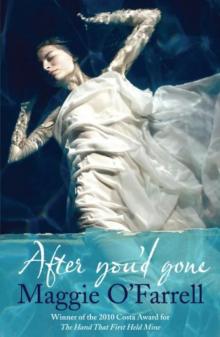 After You'd Gone
After You'd Gone The Hand That First Held Mine
The Hand That First Held Mine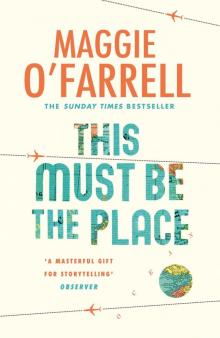 This Must Be the Place
This Must Be the Place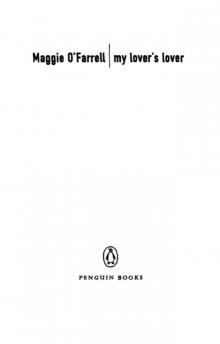 My Lover's Lover
My Lover's Lover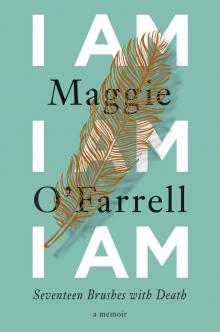 I Am, I Am, I Am: Seventeen Brushes With Death
I Am, I Am, I Am: Seventeen Brushes With Death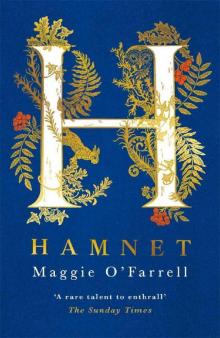 Hamnet
Hamnet Hamnet and Judith
Hamnet and Judith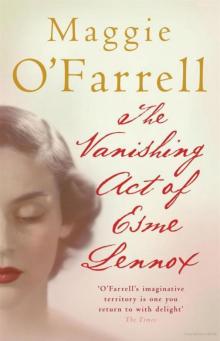 The Vanishing Act of Esme Lennox
The Vanishing Act of Esme Lennox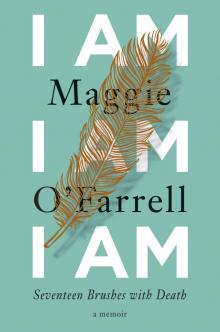 I Am, I Am, I Am
I Am, I Am, I Am